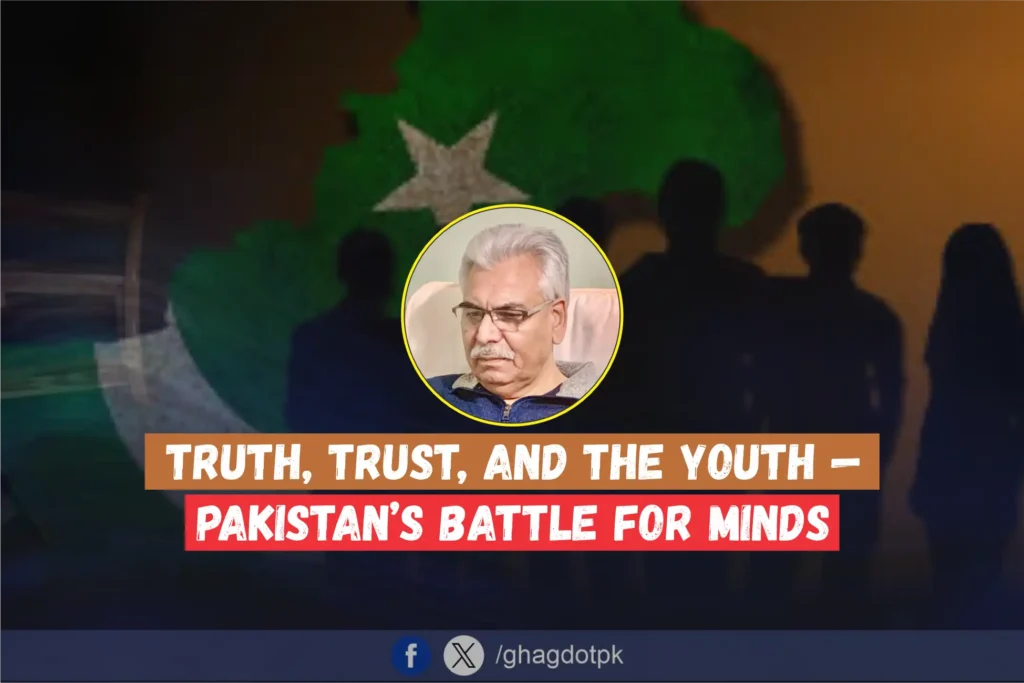By: Barrister Usman Ali, Ph.D.
Pakistan stands at the frontline of a new kind of war, one not fought with guns or tanks, but with ideas, images, and algorithms. Our youth, the heart of our future, are under siege in this invisible battlefield. They are being targeted by waves of disinformation, anti-state propaganda, and ideological manipulation, spread through unregulated and highly persuasive social media platforms. This isn’t merely a cultural erosion; it is a slow-moving national security crisis that threatens the mental sovereignty of an entire generation.
One of the root causes of this crisis is the lack of critical thinking and media literacy among the youth. In the digital age, where everyone is a content creator and misinformation spreads faster than truth, young people often lack the tools to discern reality from fiction. They place blind trust in viral videos, emotionally charged narratives, and fabricated news, especially when wrapped in slick visuals or pseudo-intellectual language. To counter this, media literacy must be introduced across our educational system. Schools and colleges should equip students to question sources, analyze the motives behind content, and detect manipulation and bias. Without these skills, young minds remain vulnerable to digital influence operations.
Equally urgent is the revival of civic education. Most young Pakistanis grow up without a clear understanding of how their country functions. They are unfamiliar with the Constitution, the roles of state institutions, and their rights and responsibilities as citizens. This vacuum is easily filled by anarchic narratives that glorify rebellion and vilify the state. Explaining how laws are made, how elections work, and why institutions matter is not just academic; it is essential to national stability. A civically aware generation is far less likely to fall for destructive calls to chaos.
Compounding the issue is the distorted, or often forgotten, history being consumed by the younger generation. Whether due to poor curriculum design or deliberate revisionism, many youth have little connection to their national story. They do not appreciate the monumental sacrifices made during the creation of Pakistan, nor the geopolitical pressures that shaped its journey. In this absence, revisionist narratives gain ground, promoting shame, apathy, or disillusionment instead of pride and accountability. Our textbooks, media, and digital platforms must present a balanced, factual, and emotionally resonant history, one that acknowledges flaws but also instills confidence, gratitude, and responsibility.
Meanwhile, the addiction to social media is not just a lifestyle problem; it’s a psychological trap. Youth today spend hours in algorithmically curated echo chambers that reinforce anger, division, and hopelessness. They are being shaped not by parents, teachers, or scholars, but by TikTokers, vloggers, and faceless memes. Many of these influencers, intentionally or not, act as tools of disinformation, glorifying rebellious cynicism and mocking national identity. We need national-level awareness campaigns, especially in Urdu and other local languages, to teach youth how algorithms manipulate content exposure, how to critically evaluate what they consume, and how to reclaim their time and mental space. Schools can conduct digital hygiene workshops, and parents must be engaged in guiding their children’s media habits.
At the same time, religion is being weaponized. Instead of being a force for unity, some elements exploit Islam to promote sectarianism and extremism. The antidote is not to sideline religion but to promote its true essence, unity, tolerance, discipline, and service. Our mosques, scholars, and madaris must take the lead in spreading a message of peace and patriotism. Presenting love for the homeland as a religious duty, grounded in authentic Islamic teachings, can inoculate youth against ideological exploitation.
Furthermore, few young people understand the sophisticated tools of hybrid and fifth-generation warfare, where enemies don’t use bombs, but narratives. Nations are destabilized by eroding public trust in the military, judiciary, and government. Economies are sabotaged through psychological operations designed to breed fear, despair, and disunity. We must educate youth on how foreign powers exploit internal weaknesses, using real-world examples from Syria, Iraq, Libya, and Afghanistan to illustrate what happens when national unity collapses under external manipulation.
Yet, it is also a bitter truth that the crisis cannot be blamed solely on the public or youth. The state’s ambiguity, selective silence, and policy of concealment have created a credibility vacuum. When the state avoids telling the whole truth, when critical events are kept behind curtains, and when narratives are shaped only through official statements or anonymous sources, lies flourish. The state must realize that truth is the foundation of trust. Without transparency, public confidence erodes, and in its place, disinformation thrives. Restoring trust demands honest communication and a consistent narrative grounded in reality, not just optics.
Lastly, we must offer better role models. Today’s youth idolize celebrities, vloggers, and controversial influencers, while real heroes, who serve or sacrifice for the nation, are ignored, vilified, or forgotten. This inversion is not only sad, it is dangerous. We live in an age where miscreants and agents of chaos are celebrated, while those who uphold the law, defend the constitution, or give their lives for national security are defamed through twisted narratives. The state, media, and civil society must urgently produce content that highlights authentic stories of heroism, those who serve with honour, often silently and at great personal cost. These figures should be made visible across TV, cinema, social media, and educational content, so the next generation knows whom to admire.
Pakistan’s future will not be decided merely by GDP charts or global alliances, but by the hearts and minds of the next generation. If our youth grow up confused, misled, and mistrustful, the foundation of the nation weakens from within. But if we choose to guide them toward truth, pride, and purpose, then they will not only protect this country with weapons if needed, but with wisdom, unity, and unwavering love. The battle is now. The choice is ours.






